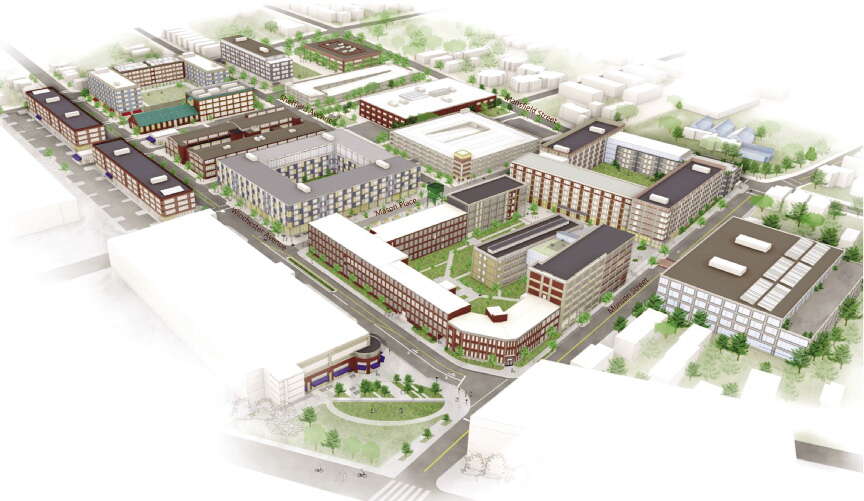
Processing Your Payment
Please do not leave this page until complete. This can take a few moments.
- News
-
Editions
View Digital Editions
Biweekly Issues
- April 29, 2024
- April 15, 2024
- April 1, 2024
- March 18, 2024
- March 4, 2024
- February 19, 2024
- February 5, 2024
- January 22, 2024
- January 8, 2024
- + More
Special Editions
- Lists
- Viewpoints
- HBJ Events
- Business Calendar
- Custom Content
Yale alum Twining wants to breathe new life into New Haven’s Science Park, surrounding neighborhood
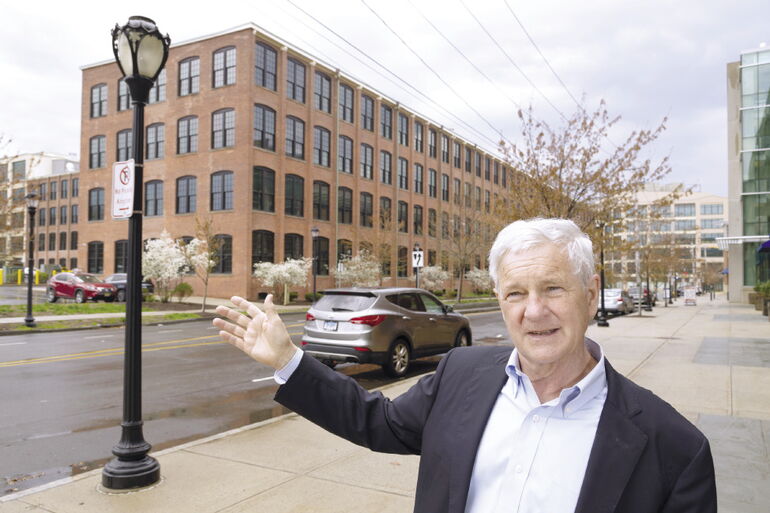 PHOTO | STEVE LASCHEVER
Developer Alex Twining has a long-term vision to transform the area around Science Park into a walkable hub of economic activity, with apartments, biotech lab and office space, restaurants and shops that will attract residents from surrounding neighborhoods.
PHOTO | STEVE LASCHEVER
Developer Alex Twining has a long-term vision to transform the area around Science Park into a walkable hub of economic activity, with apartments, biotech lab and office space, restaurants and shops that will attract residents from surrounding neighborhoods.
In its heyday, the former Winchester Repeating Arms factory was a bustling hub of economic activity for New Haven’s Newhallville and Dixwell neighborhoods, at one time drawing some 25,000 people a day into the area to work for the legendary rifle maker.
Now the site of the former factory houses Science Park at Yale and a scattered collection of other office and residential buildings, surrounded by parking lots, neglected old industrial buildings, and streets mostly void of pedestrians. It’s a suburban office park of sorts, right in the middle of an urban center.
But New York developer Alex Twining has big dreams of restoring the abandoned factory site and surrounding area to its former glory, making it a place where people will want to live, work, dine and shop.
“We’re trying to build back the density and scale and feel of the factory, because it did concentrate activity and make it a more vibrant place,” said Twining, CEO of Twining Properties, one of three partners behind a joint venture known as Winchester Partners. “We want to bring it back to having a Main Street feel.”
In 2019 Twining teamed with New York-based L+M Development Partners Inc. and Goldman Sachs on a plan to breathe new life into Science Park and the surrounding area, which it hopes to rebrand as Winchester Center as a nod to the former factory.
After several years of inactivity at the site and the exit of a previous developer, the partners are now making headway on an ambitious $300 million plan to transform the area into a walkable mixed-use life sciences and technology campus.
Their first move was spending $8 million to buy the 145,000-square-foot Class A office building at 115 Munson St., originally built in 2012 as the headquarters for now-defunct tech company Higher One, and converting it for life sciences tenants. Twining said the building, dubbed Winchester Works, is about half full and he expects it will take a year for it to be fully leased.

Meanwhile, the group is moving forward on two additional phases of the project. The partners are preparing a site plan application for a new 300-unit apartment building facing Winchester Avenue, to be constructed on a parking lot between the Winchester Lofts luxury apartments and 5 Science Park. About 20% of the apartments will be reserved for low-to-moderate income tenants.
If all goes as planned, construction could start next year and be completed by 2024.
Simultaneously, they are seeking city approval to demolish a set of contaminated factory buildings on Munson and Mansfield streets and reproduce them with new construction — either apartments or office/lab space, depending on market demand. Twining initially hoped to save and restore the historic buildings, but said the site was too polluted.
“As we build buildings on Winchester Ave., every one of those will have retail,” added Twining, who envisions everything from local restaurants and shops to brew pubs. “We feel like all of the surrounding areas will probably migrate here if we can give them something exciting to come for.”
Family ties
Twining first entered the New Haven market in 2017, when his company spent nearly $40 million to buy the Novella, the luxury apartment building developer Randy Salvatore constructed at the corner of Chapel and Howe streets.
Although Winchester Center is his first major undertaking in the Elm City, Twining says it is right in his wheelhouse. He has spent his career building mixed-use developments in similar urban neighborhoods, including apartment towers in Cambridge’s Kendall Square and Boston’s Seaport district.
But his passion is also rooted in a personal connection: his family members were among the earliest managers of Yale University, including Arthur Twining Hadley, who served as president from 1899 to 1921 and is buried in New Haven’s Grove Street Cemetery.
As a Yale College and Yale School of Architecture alumnus himself, Twining represents the sixth consecutive generation of his family to graduate from the university; his daughter Cornelia is the seventh.
“Alex has the background to do this and has the personal ambition because of his family connection to the city,” said Matthew Nemerson, one of the original creators of Science Park who worked closely with Twining as the city’s previous economic development administrator.
“He really wants to make this a legacy, which is exciting,” Nemerson said.
Twining said he originally bid on the project in 2007 but lost out to Ohio developer Forest City, which redeveloped a portion of the factory into the Winchester Lofts in 2015.
When Forest City was acquired by another company and left town, Twining was approached about picking up where the developer left off. But Twining had bigger ideas.
“We did not think that just [redeveloping the remaining factory buildings] was really going to change the neighborhood enough to make it really feel like a great place,” he said. “We eventually got the rights to redevelop all the parking lots into buildings and the rest of the buildings over time.”
When finished, the project could eventually include more than 900 apartments, retail space and 500,000 square feet of office and lab space.
Bioscience tenant
With the city still facing a shortage of lab space for companies in the burgeoning biotech industry, Twining said it makes sense for Winchester Works and any subsequent office buildings to cater to life science tenants.
He said he isn’t worried about the lab space pendulum swinging from scarcity to oversaturation when Massachusetts developer Carter Winstanley opens his new $100 million bioscience tower at 101 College St. in 2023.
In fact, he thinks Winstanley’s building could actually bolster his project by attracting more biotech companies into the city.
“The way we look at it, there are two life science clusters in New Haven. One is centered around the medical school, the other is centered around Science Hill,” Twining said. “I think there’s room for both and a need for both.”
Winchester Partners secured a $22 million three-year floating rate loan from Liberty Bank to complete the Winchester Works renovation, which included retrofitting the building to allow for wet lab space, as well as overhauling the entrance and lobby and revamping the rooftop amenity space.
Jeff Hubbard, senior vice president and commercial banking regional manager for Liberty Bank, said the bank felt confident in the joint venture’s combined decades of experience developing multifamily housing and life sciences and office buildings, and is bullish about the vibrancy of the New Haven market.
“It’s a good fit for us,” Hubbard said.
Halda Therapeutics, a drug-discovery company founded by renowned Yale scientist Craig Crews, will become the first new life sciences company to move into the development when it occupies its new 10,000-square-foot lab space at Winchester Works next month.
The company launched in Branford in 2019 after spending two years searching for lab space in the Elm City, said Chief Financial Officer Scott Phillips.
But Phillips said the company “always had an eye toward coming back to New Haven,” where it could be closer to Crews’ lab and its sister biotech, Arvinas Inc. (an earlier Crews venture that went public in 2018 and now takes up much of the two original Science Park buildings.)
He said Halda’s team has since grown to 15, and will likely expand to 30 in the new location.
“We really have high hopes for what Alex is doing there,” Phillips said of Twining’s long-term vision. “He has a very ambitious goal and if he could achieve even 70 or 80 percent of that, I think it would be a real win for the city and a win for biotech.”
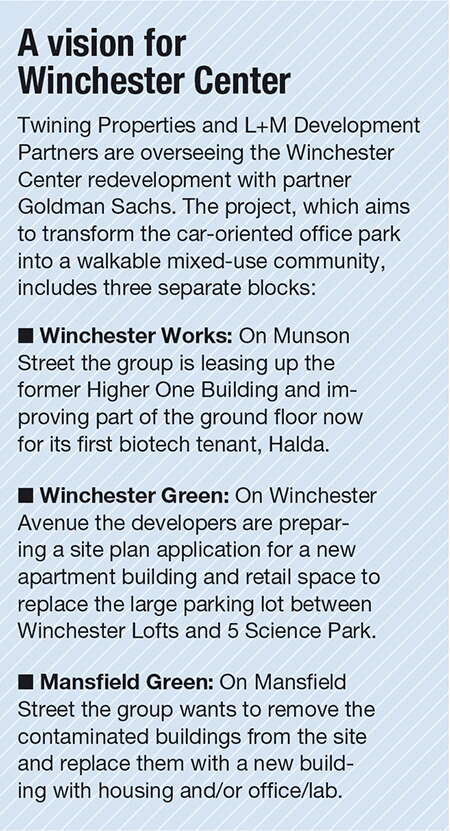

2022 Giving Guide
This special edition informs and connects businesses with nonprofit organizations that are aligned with what they care about. Each nonprofit profile provides a crisp snapshot of the organization’s mission, goals, area of service, giving and volunteer opportunities and board leadership.
Learn more
Subscribe
Hartford Business Journal provides the top coverage of news, trends, data, politics and personalities of the area’s business community. Get the news and information you need from the award-winning writers at HBJ. Don’t miss out - subscribe today.
Subscribe
2024 Book of Lists
Delivering Vital Marketplace Content and Context to Senior Decision Makers Throughout Greater Hartford and the State ... All Year Long!
Read Here-
2022 Giving Guide
This special edition informs and connects businesses with nonprofit organizations that are aligned with what they care about. Each nonprofit profile provides a crisp snapshot of the organization’s mission, goals, area of service, giving and volunteer opportunities and board leadership.
-
Subscribe
Hartford Business Journal provides the top coverage of news, trends, data, politics and personalities of the area’s business community. Get the news and information you need from the award-winning writers at HBJ. Don’t miss out - subscribe today.
-
2024 Book of Lists
Delivering Vital Marketplace Content and Context to Senior Decision Makers Throughout Greater Hartford and the State ... All Year Long!
ABOUT
ADVERTISE
NEW ENGLAND BUSINESS MEDIA SITES
No articles left
Get access now
In order to use this feature, we need some information from you. You can also login or register for a free account.
By clicking submit you are agreeing to our cookie usage and Privacy Policy
Already have an account? Login
Already have an account? Login
Want to create an account? Register
Get access now
In order to use this feature, we need some information from you. You can also login or register for a free account.
By clicking submit you are agreeing to our cookie usage and Privacy Policy
Already have an account? Login
Already have an account? Login
Want to create an account? Register


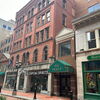
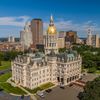


0 Comments